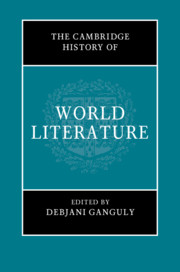Book contents
- The Cambridge History of World Literature
- The Cambridge History of World Literature
- Copyright page
- Contents
- Figures
- Contributors
- Acknowledgements
- Introduction
- Part I Genealogies
- Part II Thinking the World
- 9 Does Poetry Make Worlds?
- 10 Ecosystems of World Literature
- 11 From World Literature to World Philosophy and Back Again
- 12 Saving Europe through Weltliteratur: The Case of Victor Klemperer
- 13 Viśvasāhitya: Rabindranath Tagore’s Idea of World Literature
- Part III Transregional Worlding
- Part IV Cartographic Shifts
- Part V World Literature and Translation
- Part VI Poetics, Genre, Intermediality
- Part VII Scales, Polysystems, Canons
- Part VIII Modes of Reading and Circulation
- Part IX The Worldly and the Planetary
- Index
- References
9 - Does Poetry Make Worlds?
from Part II - Thinking the World
Published online by Cambridge University Press: 17 August 2021
- The Cambridge History of World Literature
- The Cambridge History of World Literature
- Copyright page
- Contents
- Figures
- Contributors
- Acknowledgements
- Introduction
- Part I Genealogies
- Part II Thinking the World
- 9 Does Poetry Make Worlds?
- 10 Ecosystems of World Literature
- 11 From World Literature to World Philosophy and Back Again
- 12 Saving Europe through Weltliteratur: The Case of Victor Klemperer
- 13 Viśvasāhitya: Rabindranath Tagore’s Idea of World Literature
- Part III Transregional Worlding
- Part IV Cartographic Shifts
- Part V World Literature and Translation
- Part VI Poetics, Genre, Intermediality
- Part VII Scales, Polysystems, Canons
- Part VIII Modes of Reading and Circulation
- Part IX The Worldly and the Planetary
- Index
- References
Summary
The debates about world literature tend to focus on the way literature moves in the world, the way it interacts with a world that is already “out there” relative to the actual content of the literary work. I focus here instead on the way that literature makes worlds, and on the ways that these processes of world-making point us towards a way of thinking about “world” literature that sees the latter term as an active participant in the construction of the former—or rather, in the construction of many types of the former term. The particular test case for investigation is the Chinese poetic genre known as the fu.
- Type
- Chapter
- Information
- The Cambridge History of World Literature , pp. 201 - 214Publisher: Cambridge University PressPrint publication year: 2021

